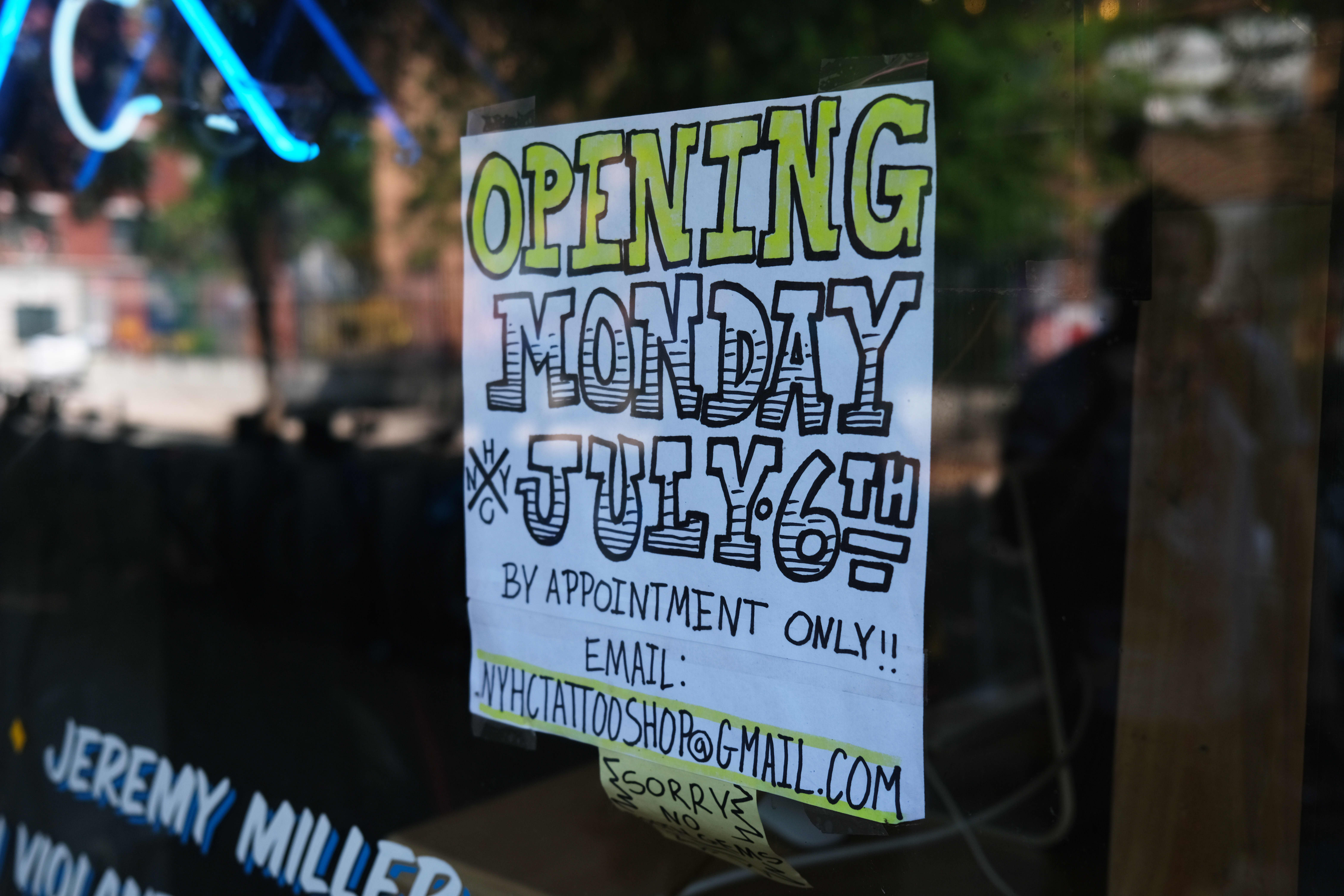The exterior of New York Hardcore Tattoos on the first day of re-opening as New York City officially begins ‘Phase Three,’ of opening on July 06, 2020.
Spencer Platt/Getty Images
Many states are pushing jobless residents to get back to work — and are using their unemployment benefits as leverage.
State officials are re-imposing rules requiring unemployed workers to look for work as a condition of receiving their weekly jobless benefits.
States generally have “work search” requirements in normal times, to encourage recipients of unemployment insurance to rejoin the workforce.
More from Personal Finance:
Social Security trust funds at greater risk of running dry
New rules for international students could cost U.S. colleges
How to handle Medicare coverage if you move to another state
Workers who don’t comply risk losing their unemployment benefits — including both the state benefits and the extra $600-a-week federal supplement being paid through July 31. They may also have to pay back some benefits they received.
Most states waived these rules at the onset of the coronavirus pandemic, as the public-health emergency necessitated social-distancing measures and economic shutdowns pushed employers to cut more than 21 million jobs from their payrolls in March and April.
Now, as states slowly reopen their economies and businesses recall people to work, officials in states like Arkansas, Missouri and Nebraska are reinstating the job-hunt rules.
States clamping down
States are likely clamping down because their trust funds have been drained amid an onslaught of unemployment applications and as they seek to limit fraudulent claims for benefits, said Susan Houseman, research director at the W.E. Upjohn Institute for Employment Research.
More than 31 million Americans were receiving unemployment benefits as of June 13, according to most recent Labor Department data. More than 1 million Americans have been filing new claims every week since mid-March.
It appears state officials are also encouraged by a recent improvement in the country’s employment metrics.
The unemployment rate dropped to 13.3% and 11.1%, respectively, in May and June as states eased lockdown measures.
That optimism meshes with the views of many lawmakers on Capitol Hill, primarily congressional Republicans, who want to end the extra $600-a-week unemployment payments and replace them with a cash bonus for people who return to work.
Gov. Pete Ricketts of Nebraska, a Republican, ordered the state’s labor department to re-impose work-search requirements beginning July 12.
Nebraska is in the third phase of reopening and state employers are currently listing more than 30,000 jobs as available, according to Ricketts’ executive order issued Tuesday.
However, there were about 57,000 people receiving unemployment insurance in Nebraska as of June 20, according to the U.S. Labor Department. There were also roughly 26,000 recipients through a separate Pandemic Unemployment Assistance program as of June 13, according to most recent data.
Missouri’s Department of Labor and Industrial Relations re-imposed work-search rules beginning this week. The Arkansas Department of Commerce, Division of Workforce Services, put its rules back in place as of June 28.
All states had eased their work-search requirements by late April and early May, around the peak of state lockdowns, according to the National Conference of State Legislatures.
Roughly half did so for all unemployment insurance beneficiaries, and the remainder waived rules just for people receiving unemployment due to Covid-19-related circumstances, according to the Conference.
A surge in Covid-19 cases across the country may push some states to pause their plans to reimpose job-hunting rules.
The Texas Workforce Commission delayed its requirement and will reexamine the decision in late July, according to a June 30 announcement from Ed Serna, the commission’s executive director.
“It is a challenging time to try to find a job, but you must make your best effort,” according to the New York Labor Department. “Essential businesses are still open and many are hiring due to spikes in demand.”
Big hurdle?
Like most aspects of the unemployment system, details will vary by state as to specific work-search requirements and how rigorously officials police the rules, experts said.
Fortunately for workers, it’s generally not too challenging to pass the work-search test and continue collecting jobless benefits, Houseman said.
“You get disqualified for not trying. But you don’t get disqualified if you don’t succeed” in finding a job, Houseman said. “It’s something of a hurdle to jump over. But it’s not a huge one.”
In Missouri, workers must complete three work-search “activities” during each week for which an individual requests unemployment benefits, unless they are in approved training, have a definite recall date from an employer, or are enrolled in a work-share program, according to the state labor department.
Examples of activities include accessing and searching for work through the state’s jobs portal at Jobs.mo.gov, participating in a Missouri Job Center workshop, attending a job interview or job fair and completing online applications, among other things.
Self-employed individuals collecting benefits through the PUA program may call on clients, submit bids or proposals or attend training.
In New York state, those activities may include online job applications, using social networking or other online means to hunt for jobs, calling or emailing employers, unions or staffing agencies, and participating in virtual workshops.
New York rules require jobless workers to document their work-search efforts and submit proof of them if asked by officials, according to the state labor department.
